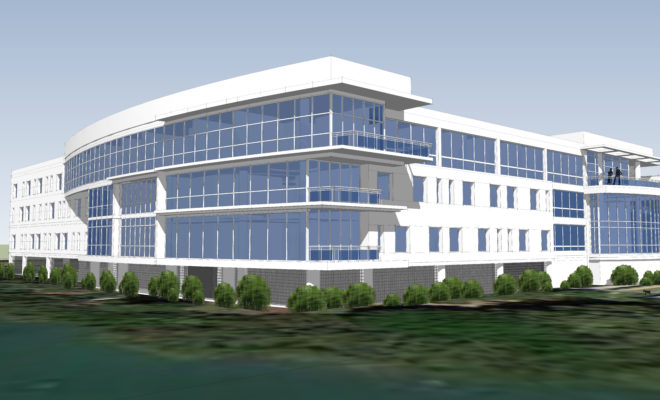
Feature
Taking Memory Care to a New Level
by Sue Cullen
MEETING FUTURE NEEDS
Plymouth Harbor’s 25-story tower has served as a landmark at the gateway to St. Armands Circle for 52 years. Throughout that time, the Life Plan Community has evolved to meet the needs of its residents and the changing desires of upcoming generations of retirees. On January 10, Plymouth Harbor will mark a new chapter in its history with a grand opening and ribbon cutting ceremony for the new Northwest Garden Building, the latest addition to its 17-acre Sarasota bayfront campus.
“We want to be sure Plymouth Harbor stays relevant into the future and offers residents a full continuum of services,” says Harry Hobson, President and CEO. “Now, in addition to independent living, we have expanded our assisted living and added memory care so that our residents can consistently receive the most appropriate level of care.”
The Northwest Garden Building is three stories on top of an underground parking garage and includes 30 memory care residences on the first floor, 30 one- and two-bedroom assisted living apartments on the first and second floors, and 10 luxury two-bedroom independent living apartments on the third floor. It is located next to Plymouth Harbor’s award-winning Smith Care Center skilled nursing facility.
The Martha Jane Phillips Starr Memory Care Residence, named for the late Starr and her major contribution, has been carefully designed to be a safe and enriching environment for residents suffering from Alzheimer’s or other dementia-related diseases and is open to those outside the Plymouth Harbor community as availability permits. It is divided into two neighborhoods of 15 private residential suites with private baths. “We want to create a homelike and secure environment, rendering it as non-institutional as possible, including family-style, casual, 24/7 dining choices,” Hobson says. “Residents have the freedom to walk the neighborhood, experience the outdoors, and satisfy their desires for large social gatherings, small groups or solitude.”
Emphasis also is placed on eliminating institutional routines. Caregivers avoid clinical language when interacting with others, and there is no visible nurses station. There also are no medical carts, overhead signage or paging systems. Residents have the opportunity to participate in familiar household tasks, such as preparing meals in the neighborhood’s kitchen or doing laundry. A family room, which includes a cozy hearth, is available for residents to gather with each other or with family and guests for musical experiences, wine and cheese, or a casual coffee klatch.
RICH IN AMENITIES AND PROGRAMS
Each neighborhood also has a Life Enrichment Center for daily activities, which can include art therapy, music therapy, dancing, and small group fitness classes. A Sensory Circle gives residents stimulating, tactile experiences using textures and items that are familiar to them. The Reflection Room serves as a private space for soothing sensory experiences or a quiet space for a family member to visit. An enclosed courtyard with a water feature and greenery provides fresh air and sunshine within a safe space. A wide range of salon services is available in the salon/spa along with manicures, pedicures and specialty services.
Inspirational programming to enhance residents’ well-being has been as well thought out as the building’s physical attributes. It’s Never 2 Late technology provides a variety of programming designed to keep individuals with dementia engaged and their minds active. In addition, all Plymouth Harbor staff members have received training in the Positive Approach™ to Care (PAC) techniques developed by Teepa Snow, who is well known for her expertise in dementia and Alzheimer’s care. “The PAC approach is all about focusing on the positives and what the person has that we can work with,” says Brandi Burgess, Plymouth Harbor’s social worker. “That way we are care-partnering and not just caregiving.”
Helping to bring these amenities and programming on board, The Plymouth Harbor Foundation has successfully completed A Commitment to Memory Campaign, which has raised more than $3.3 million, exceeding its $3 million goal, according to Becky Pazkowski, Senior Vice President of Philanthropy. The campaign is providing $1 million for capital resources and directing $2 million into a designated investment fund that will generate the annual funds needed to deliver innovative, inspirational programming and educational leadership. Plymouth Harbor intends to have educational resources for residents and their families and continual training for employees through nationally recognized leaders.
“We are planning the Doyle Trust Lecture series, supported by the Bernard and Mildred Doyle Charitable Trust, with speakers of national and international expertise to help us understand the latest in research, technology and treatment for dementia and to give us hope that someday there will be a cure,” Pazkowski says. “We also want to do more one on one counseling and support groups for families. Statistics show that for every person with dementia, five family members are affected. Our responsibility is to help them and let them know they are not alone in this disease process.”



You must be logged in to post a comment Login